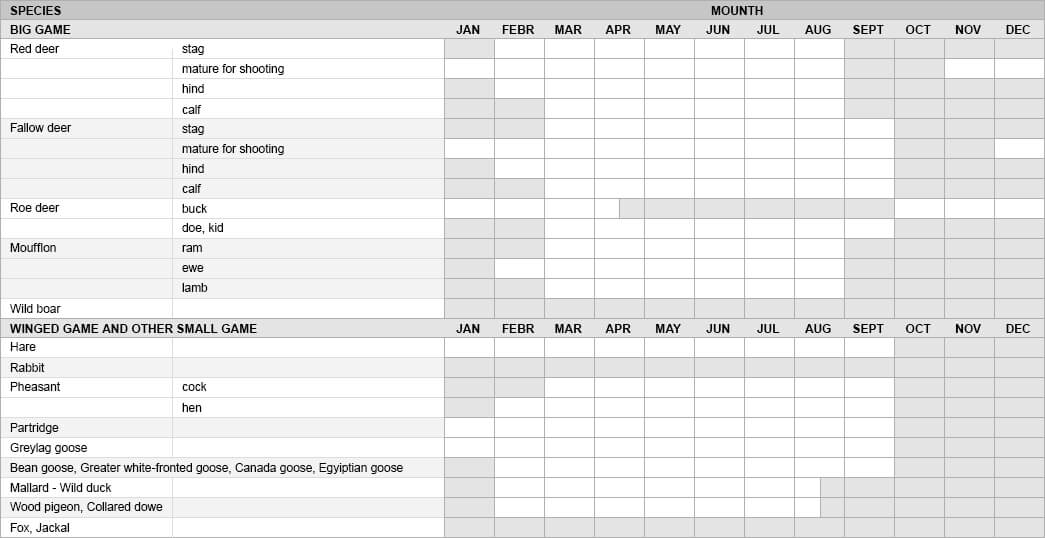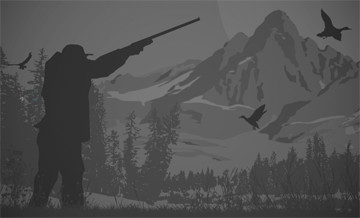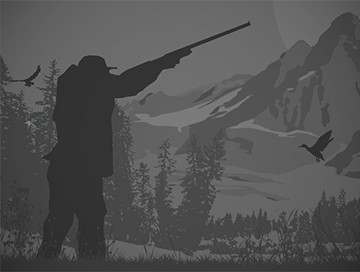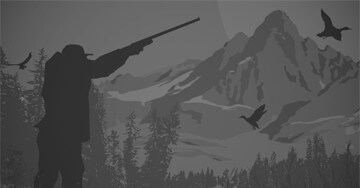Hunting in Hungary
View 23 hunts View all hunts23 hunting trips from 3 outfitters starting from $1,022
Hungary on map
About hunting in Hungary
Hungary is a country where almost anyone can find the perfect hunt. Whether you are looking for the trophy of a lifetime or simply a representative animal and a memorable experience, Hungary is a great choice. You can hunt red deer, fallow deer, roe deer, mouflon, and wild boar as well as waterfowl, pheasant, partridge, and hares. Hungarians use a variety of hunting methods, but the most common are stalking and hunting from a stand or “high seat.” Organized driven hunts are also available, usually for wild boars or pheasants. The first hunt of the year is the roebuck hunt, which starts in the middle of April. Many hunters prefer to hunt roebuck during the rutting season, which occurs at the end of July and the beginning of August. Whether you prefer to hunt early or late in the season, roebuck hunting is a rewarding and unique experience. The main hunting season starts in September, when the red stag and mouflon seasons open. You can also hunt ducks during this time. In October, you can add fallow deer to the list. October also marks the opening of the small-game seasons. Driven hunts for wild boar are typically conducted from November to January. However, you can hunt wild boar all year round. Boar hunts can be especially productive during the summer, when most hunting is conducted on agricultural lands, but stalking and stand hunting can be good in the fall as well. Hungary is a small country, but it contains a variety of habitats. There are forested mountains, sweeping plains, large rivers, and many lakes. The natural beauty of the countryside, together with the comfortable lodges, hotels, and spas, as well as the amazing Hungarian cuisine and wine, will make your hunting trip to Hungary a memorable one. Hungary is a great place to take your family along; you can easily arrange a family vacation/hunting combo. Hungary is proud to be home to the headquarters of the C.I.C. (International Council for Game and Wildlife Conservation), an international organization dedicated to sustainable and ethical hunting and the scientific ideals of wildlife conservation.
What you need to know
-
1. Planning your trip
-
2. Upon arrival
-
3. Hunting
-
4. After the hunt
Planning your trip
Visas
Hungary is in the Schengen zone, where travel on a single visa is allowed between the European countries inside the zone. American, Canadian, and EU passport holders, as well as those from certain other countries, can stay in Hungary for up to 90 days without a visa, as long as the passport is valid for at least three months beyond the visit.
Permission to hunt
Foreign hunters will need a permit to hunt, which is issued by the Hungarian authorities. Permits can be issued for 30 days, 6 months, or 1 year. Your outfitter should be able to secure this for you for a fee. You’ll need to provide your name, passport number, and firearm information. Check with your outfitter for exact details on what is required.
Hunting seasons (off-season in white)

Upon arrival
Gun export/import for non-EU citizens
When arriving in the country, hunters must declare their guns and show their letter of invitation to hunt, which will be provided by the outfitter.
The letter should include the hunter’s name, passport number, and details of the gun(s), including caliber and serial number. The hunter may also be required to show gun registration or other paperwork.
In addition, there is a fee of 3000 HUF (~10 EUR), which must be paid in cash to the customs office in order to receive a gun import document.
Important: Don’t lose the gun import document. You will be required to produce it upon your departure from the country.
Hunting
Constraints
The following are prohibited when hunting in Hungary:- silencers
- automatic or semi-automatic rifles
- any electronic optical equipment on the gun such as night vision sights or thermal imaging equipment
Climate
The climate of the country is continental, so winters are mild.
After the hunt
Trophy evaluation
Each big game trophy, including any wild boar tusks over 16 cm, must be presented to the official trophy jury. The trophy fee will be based on the weight/length as officially determined by the trophy jury. Citizens of the EU may then take their trophies home with them as long as they have documentation from the trophy jury. If you leave the hunting territory without having the trophy inspected, it is possible to make the final payment later, but you will likely incur significant additional costs, such as customs agent fees, trophy transport within the country, and packing and shipping.
Trophy fee structure
Red deer stag
The fee is based on the weight of the antlers and skull with upper jaw measured at the official trophy evaluation, 24 hours after boiling and cleaning. Grandels (ivories) are considered part of the trophy and incur no additional charge.
Roe deer buck
Trophy fee is based on the weight of antlers and skullplate measured at the official trophy evaluation, 24 hours after boiling and cleaning. Upon request, the trophy can be weighed with full skull. In this case, the hunting guest is expected to pay the fee for the corrected weight.
Mouflon ram
Fee is based on the average length of the horn measured at the outer curve.
Fallow deer stag
Trophy fee is based on the weight of the antlers with skull and upper jaw measured at the official trophy evaluation, 24 hours after boiling and cleaning.
Wild boar
The fee will be based on the average length of the bigger tusks measured at the outer curve.
Important: If the trophy taken is 10 to 15 percent larger than the hunter requested (the exact percentage depends on the territory where it was taken) the hunter must pay the full price of the trophy fee. If the difference is greater than this, the client is not required to pay the difference.
VET documentation
Upon request, the outfitter should be able to arrange an official VET certificate for the trophies. If additional local documents are required, the outfitter should also be able to arrange for their completion. However, don’t expect the outfitter to be responsible for any other documentation that may be required for import to another country, especially if the hunter is from a non-EU country.
Price distribution
Special offers
Reviews
Interested in this destination? Create a subscription to get offers right to your inbox




